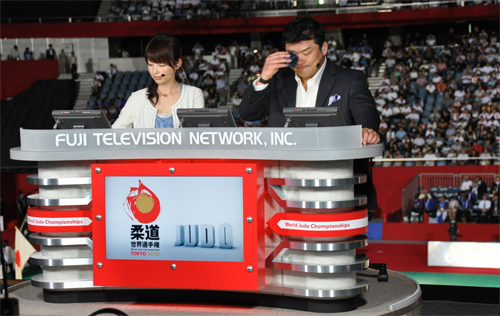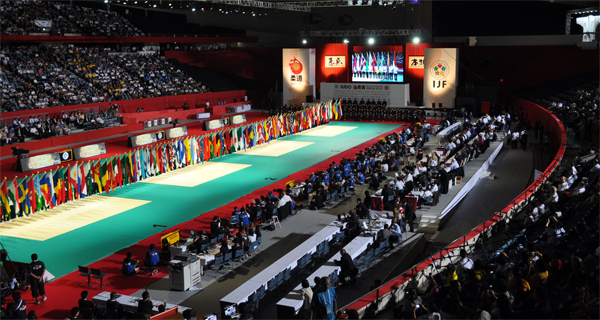Before I left for the Worlds, one of my readers suggested that the Judo at the World Championships in Tokyo would probably be more exciting than what many of us had witnessed on TV during the Miami World Cup held just ten days prior to the Worlds. Truth be told is that he was both right and wrong. Let me explain why.
Watching Judo on screen (TV or Internet) and watching it in person at the venue are two different viewing experiences. The sights and sounds at the venue make a boring spectator sport a little more palatable to watch. The TV cameras, special lighting, announcers, and cheering and jeering spectators create a much more dynamic atmosphere to watch Judo matches. The bottom line, though, is that like many sports- baseball and soccer come to mind- Judo is boring most of the time, and very exciting only occasionally. It’s hard to stomach all those 2-1 or 3-2 shido matches and all the futile drop Seoi nage, but great when a player uncorks a powerful Uchi mata or O soto gari.
Ultimately, Judo may never become a spectator sport outside the Judo community, and that’s OK. But for goodness sake, let’s at least make it appealing to the few within our community who have the courage and financial means to attend, or the willingness to watch on screen. The general public may still not attend our events or view them on TV, but more people within Judo might. So, how do we make Judo more appealing on air and in person, and how do we bring passion to the sport? I have a few suggestions.
Obviously, the scoring system needs to change. Punishment (shidos) hasn’t made Judo more appealing. I’m betting that reward (positive scores) and the abolishment of terminal ippon will make Judo more dynamic with more risk taking and potentially more scoring opportunities. We also need to go to a numerical scoring system, which is easier to understand, and which would allow us to award more points for certain highly desirable techniques, i.e. high amplitude throws, and fewer points for techniques that are not desirable. By the way, the new gi with its softer, more graspable collar, which will debut in 2011 and was on display at the 2010 World Championships, should also make it easier to do positive Judo.
The IJF tries very hard to eliminate passion from Judo. Case in point: the treatment of coaches. As you will recall, coaches are now hidden behind advertising panels and have been told to behave in the coaching chair. Standing up, raising an arm above shoulder level, and celebrating are strictly forbidden. If a coach does any of these terrible acts, he or she will be approached by a member of the referee gestapo, and perhaps be asked to leave!
Rosicleia Campos, coach of Brazil’s women’s team, is very passionate and demonstrative. She buries her head in her hands when her athletes lose, and jumps up and down when they win. She hugs. She implores. She wills her athletes to greater heights. And when her athlete leaves it all on the mat, like Sarah Menezes did during her 48kg semi-final match, and is unable to walk back to the athletes area on her own, she will carry that athlete out like a rag doll. During a match won by a Brazilian player, while the referee gestapo was trying to calm Ms. Campos’ exuberance, three of the four TV cameras on that mat were fixated on her! Her jumping Online Pokies up and down was prominently featured on the large screen in the Yoyogi arena. What the IJF doesn’t understand, but TV networks do, is that passion, excitement and showing your emotions sells. Emotional austerity doesn’t.
Since we’re on the subject of passion, what about our on-screen announcers? How can boring Judo matches be exciting if our announcers are monotonous and boring. What we need is a Judo Andres Cantor. Cantor is a prominent Spanish-language soccer broadcaster. As of this writing, he is featured in a GEICO TV commercial announcing a chess match. It’s priceless. His passion for the game and his delivery can make any boring activity look exciting. And speaking of announcing, I found it curious that in Tokyo, they announced the winners at the end of the matches, but almost never announced the fighters at the beginning of the matches. With four matches going on at the same time and rather small scoreboards, which made it difficult for those of us in the nosebleed sections to see the name of the players, announcing the names would have been helpful for the spectators.
For on-screen viewing, in addition to more passionate network announcers, it would go a long way if the background noise were more prominently featured in the broadcast. Of course, if the crowd at the venue is comatose, as is often the case, then perhaps we need to use sound tracks to artificially produce crowd noise. Arena announcers can also step up to the plate and act as cheerleaders to get the crowd into the matches. Admittedly, it’s hard to get people excited if shidos are the only thing happening. The cure for that, again, is change the rules and scoring. In Tokyo, many of the Japanese players had their own cheering sections. That was good. Unfortunately, there weren’t enough large foreign delegations to pick up the slack when a Japanese player was not on the mat.
The stands in Tokyo were never full. I found this disconcerting, since Japan is the birthplace of Judo. Judo tournaments often seem to be held in arenas too big for too few people, often producing a not-so-electrifying atmosphere. It also doesn’t help when areas close to the mats are reserved for overwhelming numbers of officials and VVIP (Very, Very Important Persons) rather than spectators. On many occasions fellow spectators complained about how far away they were from the action. Take a look at the picture below. Far too much space was devoted to the path the athletes took to get to their mat (Left side of picture behind the flags and advertising boards,) and to the cloth-covered tables where an assortment of VVIP would sit (right side of picture.) All that wasted space should have been covered with bleachers, putting spectators much closer to the action. The athletes entrance path and the score tables/officials should have been on one side. I don’t fault the Tokyo organizing committee for this, or any other organizing committee. The fault always resides with the IJF and with national governing bodies, like USA Judo, which seem to value officials and VVIP more than they do spectators, and thus impose their attitudes on the local organizing committees.
Lastly, after six days of not sleeping due to jet lag, I bought melatonin and valerian, two natural sleep aids. I took 15 mg of melatonin and 1,350 mg of valerian, and slept like a log. Next trip, I’ll know better than to wait for day six to act.




I’ve always enjoyed Neil Adams’s commentary on his DVDs, but I’ve wondered if there were any other great commentators (in English) that I just hadn’t come across. Doesn’t sound like it.
Man, you really zeroed in on the issues!